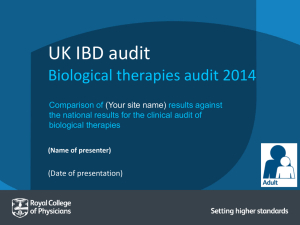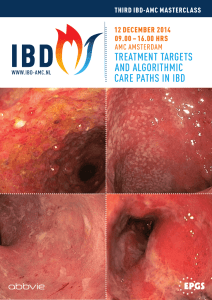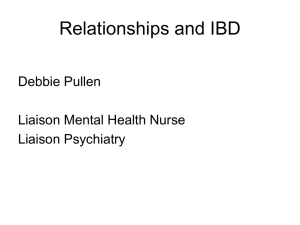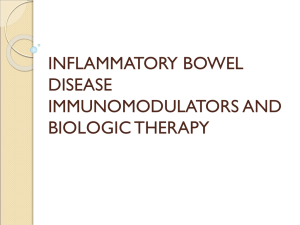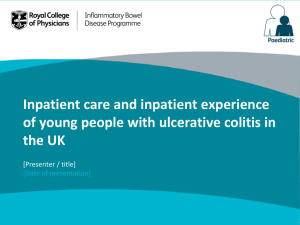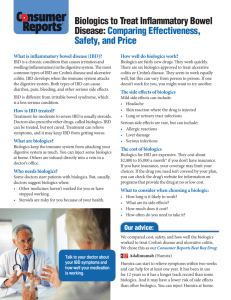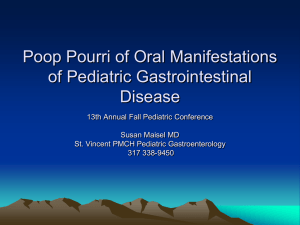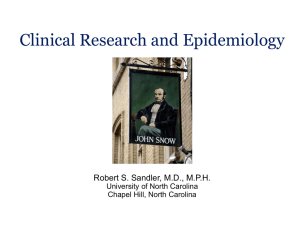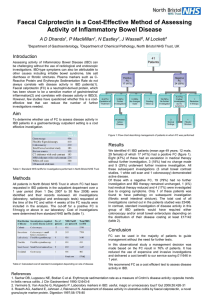Paediatric biological therapy audit presentation
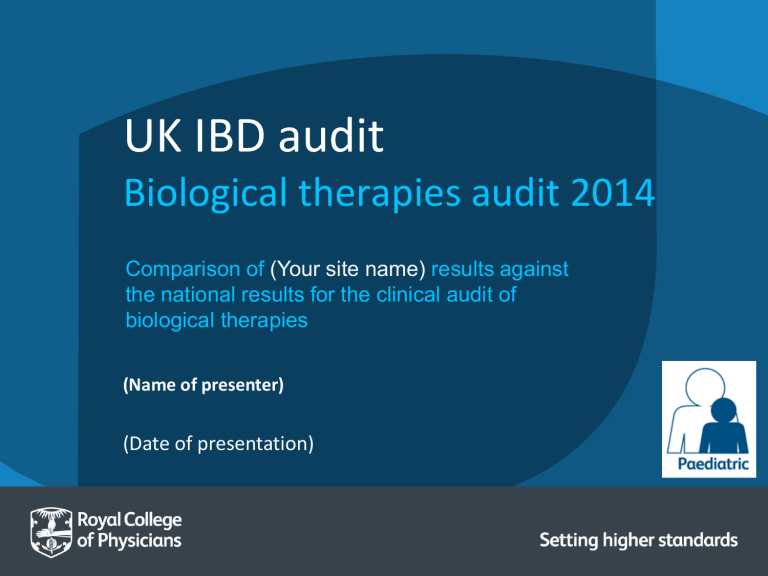
UK IBD audit
Biological therapies audit 2014
Comparison of (Your site name) results against the national results for the clinical audit of biological therapies
(Name of presenter)
(Date of presentation)
Participation
• Sites are eligible to participate if they give biological therapy to IBD patients.
• 23 out of the 25 (92%) specialist paediatric IBD sites are participating in the biological therapies audit or in the
Personalised Anti‐TNF Therapy in Crohn’s disease study
(PANTS)
• On 28 February 2014, details of 524 patients had been entered.
• Only those cases that are locked on the data collection web tool are able to be included in national analyses
Key results
Summary of paediatric patients included in national analysis
Patients a
Initial treatments
IFX
ADA
Follow up treatments
IFX
ADA
All treatments total
CD
429
459
396
63
1511
1414
97
1970
Your site
??
??
??
??
??
??
??
??
a 30 patients with CD / 4 with UC / 4 with IBDU were treated with both IFX and ADA
UC
76
80
73
7
180
174
6
260
IBDU
19
23
19
4
34
32
2
57
Total
524
562
488
74
1725
1620
105
2287
Key results
Summary highlighting key data items for CD
CD – Paediatric
% (n/N)
Percentage of all patients that were classified as having CD (all CD + UC + IBDU patients included)
82% (429/524)
General patient characteristics
Gender: Male
Age at diagnosis, median (IQR) a
Age at initial treatment, median (IQR) a
Time from diagnosis to treatment in years, median
(IQR) b
62% (267/429)
(N=412)
12 (9, 14)
(N=412)
14 (12, 16)
(N=414)
1.42 (0.63, 2.97) a b
Denominators change to exclude cases where date / disease severity score was not provided
Where a patient switched treatment, the first treatment the patient received was used
Your site
??
??
??
??
??
Key results
Summary highlighting key data items for CD continued
CD – Paediatric
% (n/N)
Disease distribution (15 paediatric patients had no IBD disease details recorded)
Terminal ileum (L1)
Colonic (L2)
Ileocolonic (L3)
None of these
Any part of the gut proximal to the terminal ileum (L4)
Yes
Perianal involvement
Yes
10% (40/410)
40% (164/410)
40% (166/410)
10% (40/410)
79% (288/364)
54% (146/270)
Your site
??
??
??
??
??
??
Key results
Summary highlighting key data items for CD continued
CD – Paediatric
% (n/N)
Your site
Pre-treatment surgery recorded a
Yes 16% (67/429) ??
Response to treatment and remission (at any follow‐up between 10 and 14 weeks) a
Response to treatment
(Paediatric patients: PCDAI drop of >15)
Remission achieved
(Paediatric patients: PCDAI score of <10)
Adverse events (at any follow up treatment)
77% (53/69)
65% (46/71)
??
??
??
Number of adverse events reported 3% (43/1480)
Number of patients that experienced at least one adverse event
10% (32/316) a Denominators change to exclude cases where date / disease severity score was not provided
??
Key results
Audit objective: appropriateness of prescribing anti-TNFα
CD paediatric compliance with a selected TA187 NICE criterion
National CD data % (n/N)
Your site
Criterion 1.5
• aged 6–17 years with severe active CD only
• if the disease has not responded to conventional therapy, or
• the person is intolerant of or has contraindications to conventional therapy
Patients with PCDAI score of ≥45 prior to commencing anti‐TNFα
14% (28/201) ??
Patients who were treated with conventional therapy
93% (354/382) ??
Appropriate prescription in compliance with NICE criterion 1.5 (TA187)
12% (25/201) ??
Key findings
• Participation by specialist paediatric sites was encouraging
92%.
• It is likely that a minority of cases were entered at some sites.
• 524 paediatric patients audited of these there were:
• 488 initial treatments with infliximab and,
• 74 initial treatments with adalimumab
• For patients with CD, treatment with a biologic resulted in
• response rate of 77%
• remission in 65% of patients
• Informed consent to receive treatment is taken for the majority of patients (99%)
• Recorded adverse events for patients with IBD are uncommon.
• Acute treatment reactions and infections are the commonest events, recorded among 10% and 7% of all patients, respectively.
Key findings continued
• 80% of patients with Crohn’s disease are receiving concomitant immunosuppression at initial treatment.
• The use of biologics in paediatric patients with ulcerative colitis is increasing.
• Routine collection of patient-reported outcome measures
(IMPACT III) is low in clinical practice
• 18% at baseline
• 5% at either 3- or 12-month follow-up.
• 12% of patients with CD were appropriately prescribed in compliance with NICE criterion 1.5 (TA187)
Key findings continued
• Severity of CD at initial treatment, assessed PGA, was reported as moderate in 54% of patients, severe in 37% and mild in 8%. The majority of patients being started on anti-
TNFα treatment for CD had a median PCDAI score of 23, indicating a disparity between the two assessments.
• Children with Crohn’s disease receive treatment with a biologic significantly earlier in the disease course than adults
1.42 vs 5.23 years, respectively.
National recommendations / action plan
National recommendations Action required Staff responsible
1. Sites should continue to participate in the national biological therapy audit and aim to submit data on all appropriate patients wherever possible. Data can also be entered by taking part in the Personalised Anti-TNF
Therapy in Crohn’s disease study
(PANTS).
3 Data entered in the study will be analysed and included in the next national report, to be published next year.
2. Sites should routinely assess disease activity at baseline and again at 3- and 12-month follow up. This measure is a vital part of objective assessment of the appropriateness of initial treatment, response and whether ongoing treatment is still clinically appropriate.
Eligible sites should participate in either the biological therapy audit or the PANTS research study and submit data on all newly started patients on biologics.
Where possible, collaborate with other sites that have a well-established methodology for capturing data on new patients starting on biological therapies
Ensure that a mechanism is in place to allow the collection of disease activity scores at baseline and follow-up
Consultant gastroenterologists
IBD nurses
Infusion clinic staff
Consultant gastroenterologists
IBD nurses
Infusion clinic staff
Progress at your site
National recommendations / action plan cont.
National recommendations Action required Staff responsible
3. The PCDAI may not fully capture the appropriateness of biologics treatment for all patients based on current clinical use. Using different disease activity assessments, such as the wPCDAI or PGA, or combining assessment with other parameters may help to address this issue.
4. Local teams should encourage patients to complete IMPACT III, patient-reported outcome measure at baseline and again at
3- and 12-month follow-up; this measure also forms an important part of objective assessment of response to treatment and the quality of care provided by the
IBD service.
(
Ensure that a mechanism is in place to fully capture the appropriateness of biologics treatment for all patients based on current clinical use.
Ensure that a mechanism is in place to allow the collection of patientreported outcome measures at baseline and follow-up. A copy of the IMPACT III questionnaire can be downloaded from the web tool www.ibdbiologicsaudit.org
/ )
Consultant gastroenterologists
IBD nurses
Infusion clinic staff
Consultant gastroenterologists
IBD nurses
Infusion clinic staff
Progress at your site
National recommendations / action plan cont.
National recommendations Action required Staff responsible
5. Sites participating in the audit should export their own local data and use them for local analyses, benchmarking and quality improvement activities.
6. The findings and recommendations of this report should be shared at relevant multidisciplinary and clinical governance / audit meetings, and local action plans for implementing change should be devised.
Identify an appropriate time to discuss results and decide priority areas for improvement
Identify an individual to present the findings at an appropriate meeting. Ensure that this activity has been planned and, when planned, that there is capacity in the meeting to review where changes are required and that action plans for implementing changes are devised
NHS managers
Consultant gastroenterologists
IBD nurses
NHS managers
All members of the
IBD team
Progress at your site
7. ENTER THE LOCAL ACTIONS YOU
HAVE IDENTIFIED HERE
8. ENTER THE LOCAL ACTIONS YOU
HAVE IDENTIFIED HERE
